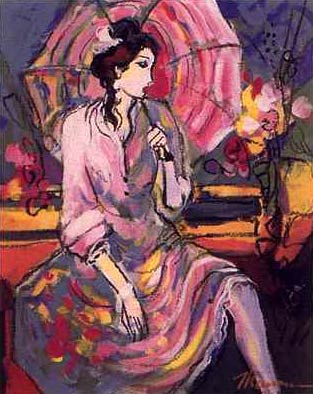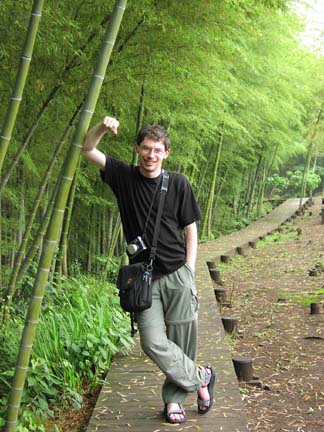
You Speak Good English
by Aaron Paulson
“Cultural differences,” he said, tossing back another shot of rice
wine, “who taught you that one?”
“You have always been kind with such a bad student.”
“But you’ve improved so much! If you stop now you’ll lose everything.”
“Our time together has been delicious,” she said, brown eyes lowered
to the tabletop. “But I cannot be your girlfriend.”
“Why not?”
“I am almost thirty now, and my life will be over soon if I do not
find a husband.”
“Is it because of last night? Look, I’m sorry about that. I didn’t
mean…”
“I think you must find a younger woman,” she said, and stood up to go.
“A teenager, or college student, to make you happy. Please have a good
time in my country, Megook.”
That was it, he thought. What he’d come halfway around the world to
find. So familiar but so alien. Five thousand years of breeding and culture
walking out the door on him. High heels and a black and white baby-doll
dress. Flesh colored stockings. The real thing.
Megook stumbled out of the street-level drinking tent, into a labyrinth
of back alleys and squat houses and close-pressed apartment blocks. Gangs
of neighborhood boys and girls clustered around open-air noodle stands
ands fish grilles and new motor scooters. Escapees from matchbox apartments,
smoking cigarettes and acting tough and sexy. Some of them came to the
language institute after school. Now they flirted and played and
ignored the alien that walked down their streets, onto the new thoroughfare lined
with modern apartment buildings and steakhouses and buffet-style
restaurants. He looked up hopefully as a female voice followed him out of the alley,
but it was only a middle school student, still in uniform, showing off to her
friends.
From the backmost seat of the bus, the suicide seats, his roommate
called them, the moon rose as a sliver of raw fish over new apartment blocks
that rose out of paddies like sore teeth and stretched off to the distance.
The bus followed a river that uncurled between low mountains like a dragon
stretching out in its dreams. By dawn, smog would condense into a cloud
the color of cherry blossoms. But for the moment the night seemed clear,
the streetlights arcades of lanterns strung out between the monumental
architecture and decaying concrete of this capital city. Megook could
barely make out the pagodas and broad-hipped temples off in the hills,
geometric characters written on the parchment of sky.
Crowds swarmed around the glittering facades of five-star hotels and
department stores downtown. A platoon of bored men, not much younger
than himself, conscripted into grey coveralls and riot helmets, stood with
bamboo swords at rest around the gothic stone City Hall and the statue of a
medieval admiral. Megook followed familiar landmarks along the unnamed
streets: office towers jutting out of the skyline, neon red crosses
marching along the rooftops like an invading army, billboards and giant
skyvision television sets advertising new cars and computers and rice cookers and
whiskey. The occasional blonde or brown-haired head bobbed out of the
river of black hair as Megook made his way through a night market of fish
stalls and butcher shops glowing brothel-pink down unlit alleys.
Out again in the streets, lined with fast food restaurants and
traditional and Western-style wedding shops and pharmacists, Megook hung a left at
the university gates, and joined a line of young people secreted between
the outdoor toilet of a seafood restaurant and the blacked-out staircase of
a basement nightclub.
But this place wasn’t what he wanted. This wasn’t it at all. His students
had failed him again, and Megook found himself in a crowd of foreigners
all standing around with imported beers in their hands, and even the few
locals in the place were dressed like students from Megook’s alma mater. He
ordered a beer in guidebook localize, and cast his eye over the crowd and
caged-off dance-floor. The foreigners, who kept themselves buttoned down all day
in teacher or business suits now bared midriffs and piercings, and seemed
obscenely fleshed-out in a country that still carried the memory of
famine, disease, and war.
The real thing, Megook had already decided, was a stork, was a praying
mantis stretched out on a branch of a cherry tree. And it was the real thing
Megook had come half-way around the world to find. Not some shadow, not
some second-rate imitation of the hamburgers and
milkshakes he’d left in his mid-sized, middle class suburban hometown
in the midwest. Even the nickname "Megook," foreigner, that his students had given him seemed
closer to the edge of life he wanted, than the Biblical name his
parents had bestowed on him some thirty-odd years ago.
The crowd in the bar stank of loneliness and homesickness. Megook wasn’t interested in their women.
He was here to lose himself in the exotic and foreign and new. To re-mold
himself in the crucible of experience. To transcend the familiar and mundane,
and emerge as a new man: a citizen of two worlds, with a new language and
all the ideas and experiences it could express.
He spotted it through the curling mists of cigarette smoke and sweat
rolling off the dance-floor: the real thing. She was perched on a
stool, at the edge of a group of locals and foreigners passing pitchers of beer
and packs of cigarettes around their corner of the bar. She was as thin and
delicate as a line of ink drawn across a sheet of rice paper. A mayfly
clutching a reed. A cat’s whisker floating in a breeze. He was drawn to
her carefully painted doll face. Her raven hair and cat eyes. The animal
twitch and curl barely concealed under a silk top and leather mini-skirt.
Megook made his way through the crowds of desperate pleasure seekers queuing
for drinks, and stood for a moment behind her chair. Heard the tail end of
a refusal to dance.
“You speak good English,” he finally thought to say.
She turned her large brown eyes on him, and Megook saw there her
country’s epic tales of love and war, the poetry of the moon and stars reflected
in a crust of ice on a cherry blossom, silk pennants hanging from palaces
and temples and gates, and the written characters of her mother tongue
dancing across pages of rice and silk and stone. She looked at Megook standing
tall and awkward and stinking of too much cologne and the worn collar and
cuffs of his shirt and the flecks of dried urine on his shoes.
“And how,” she said, over the industrial-strength dance music, “and
how the fuck would you know?”
©2001 by Aaron Paulson





